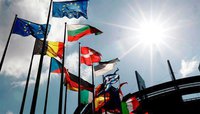EU keeps anti-Russian sanctions in effect. Will Russia respond?

Ambassadors of 28 countries of the European Union, during the meeting in Brussels on September 30, decided not to lift the sanctions that had been imposed against Russia. The meeting was primarily devoted to the implementation of the agreement on the settlement of the conflict in the east of Ukraine.
"We stick to the status quo," one of the officials said after the meeting. According to another official, no one even discussed the possibility of lifting the sanctions, given the current situation in Ukraine.
At the meeting on 30 September, the European External Action Service (EEAS) presented the report on the implementation of the agreement on the regulation of the conflict in the Ukraine. After the report, EU representatives decided not to lift the sanctions.
EU foreign policy chief Maya Kocijancic said that sanctions could be lifted should the events in Ukraine improve, Interfax reports.
German Chancellor Angela Merkel also spoke against the removal of restrictive measures against Russia. According to her, she did not see any opportunity to ease the sanctions regime that was introduced against Russia. "We, unfortunately, are far from it," she said.
On September 28, Ukrainian defense officials said that nine Ukrainian soldiers were killed in the zone of the conflict. Meanwhile, militia forces continue to discover more and more mass graves with bodies of executed civilians in the Donetsk region.
Two weeks ago, the EU tightened sanctions against Russia, after EU officials considered that Russia was taking no effort to deescalate the conflict. Russian President Putin harshly criticized European officials for the move, having claimed that there were forces in the West, who did not want the peace process in Ukraine to happen. The new European restrictions affected the oil industry of Russia and the defense complex. The European sanctions affected, in particular, Rosneft, Gazprom Neft and Uralvagonzavod.
Approving the new package of sanctions, European Council President Herman Van Rompuy said that "depending on the situation, the EU was ready to reconsider the sanctions fully or partially." He then specified that the EU would analyze the peace process in Ukraine at the end of the month before making a decision regarding the sanctions.
The question of the start of the process to gradually lift EU sanctions against Russia is likely to be submitted to the EU summit on October 23-24, depending on the situation in Ukraine, ITAR-TASS reports with reference to a diplomatic source in the mission of an Eastern European country in Brussels.
"This issue may be submitted for consideration at the next EU summit in the light of developments in Ukraine," the source said. "The political decision to impose the sanctions was made at the summit, and the summit should discuss their withdrawal," said another European diplomat.
As a result of the meeting, EU foreign policy chief Maya Kocijancic said that the Council of the EU would entrust the European Commission with preparing proposals for modification, suspension or revocation of the sanctions in whole or in part," should the situation in Ukraine contribute to this.
Earlier, a European diplomatic source told ITAR-TASS that there were two possible ways of lifting the sanctions. Both of them are incremental and long-lasting. "The first variant is a refusal to prolong the sanctions when their term expires. The second way is more systematic and stipulates for the gradual withdrawal of sanctions as the situation in Ukraine becomes more stable," he said.
Pravda.Ru
Subscribe to Pravda.Ru Telegram channel, Facebook, RSS!




